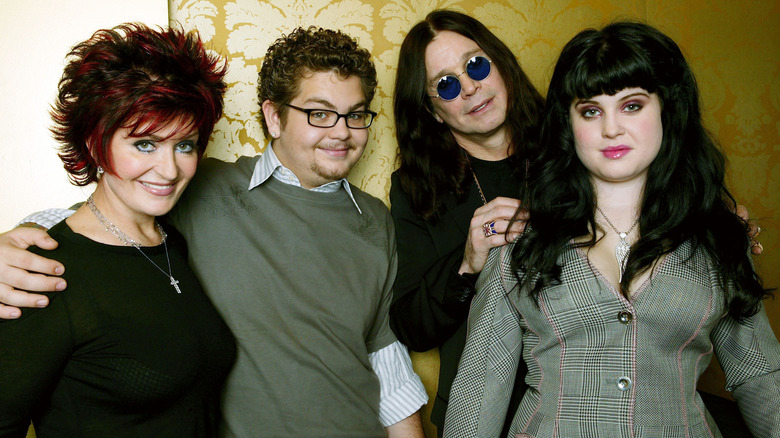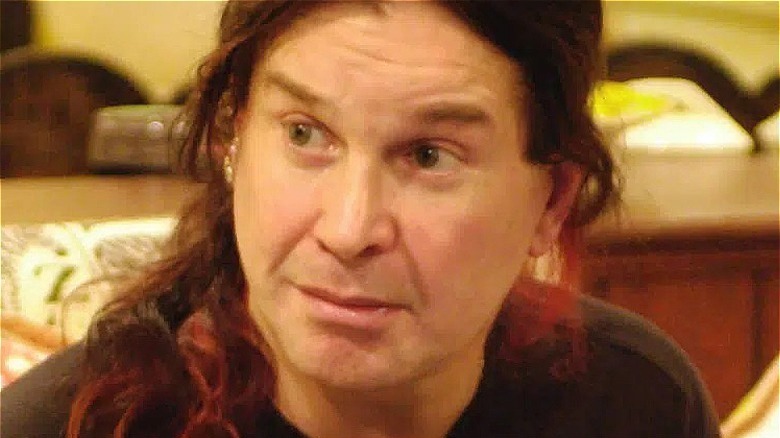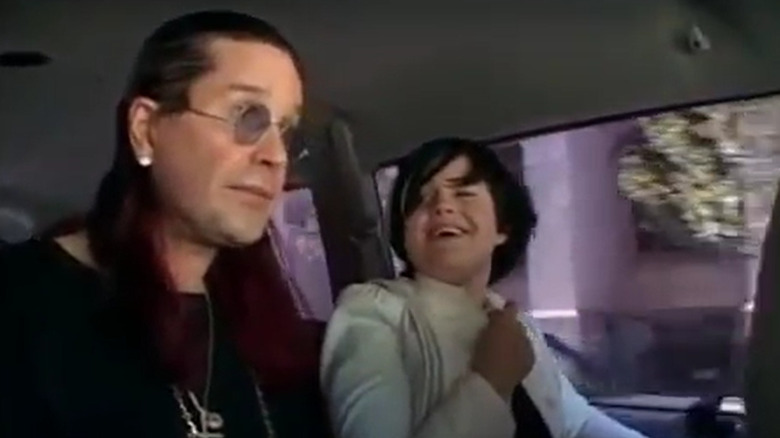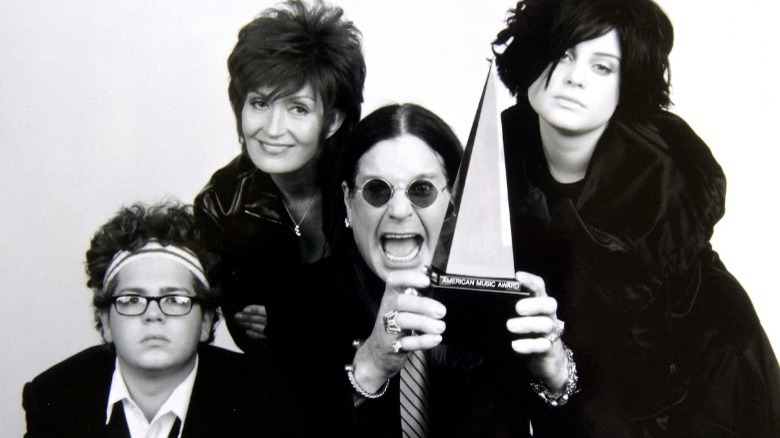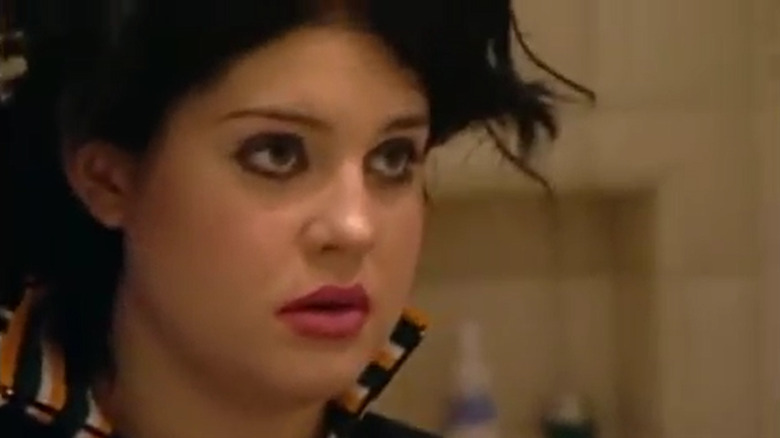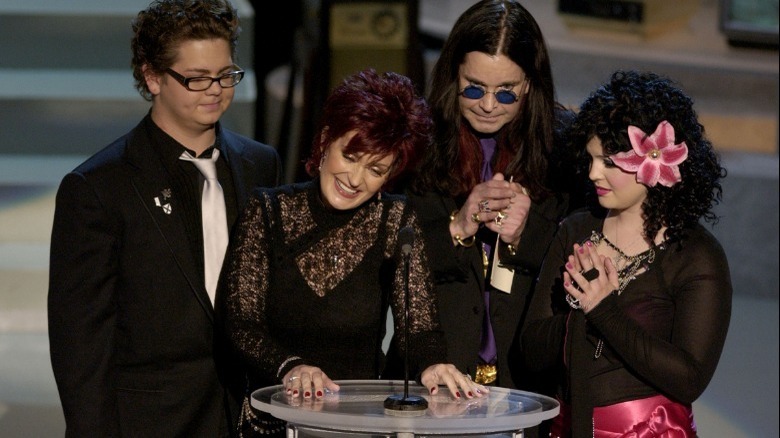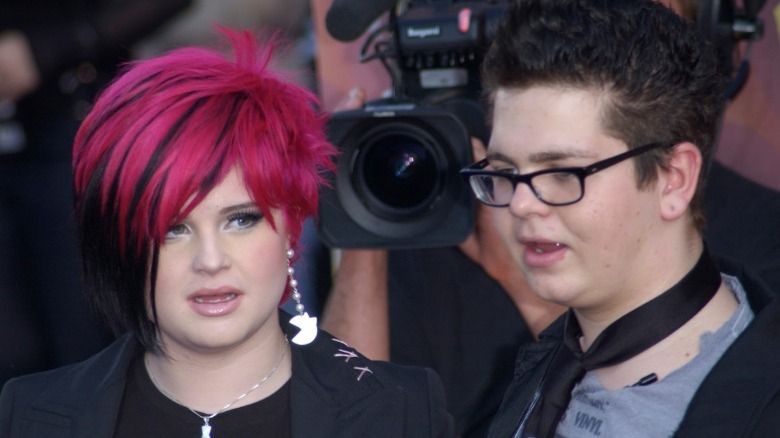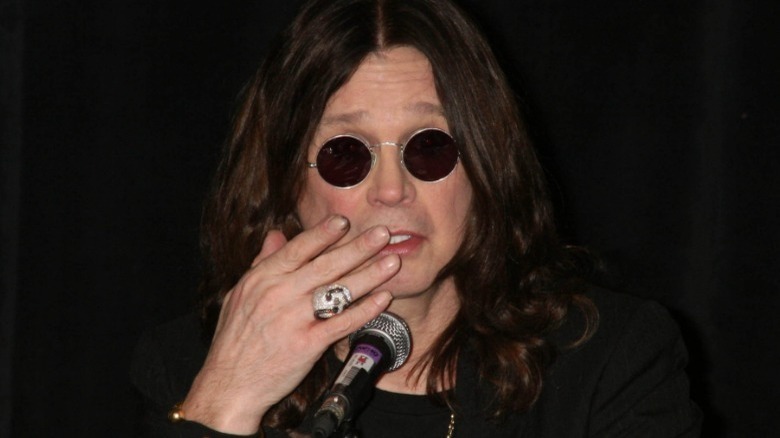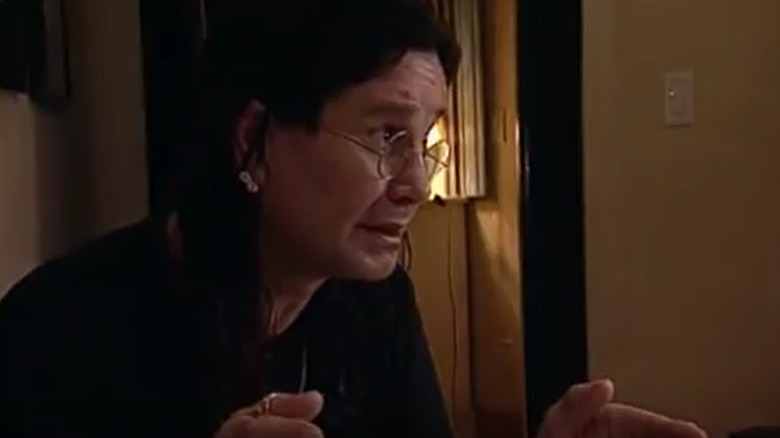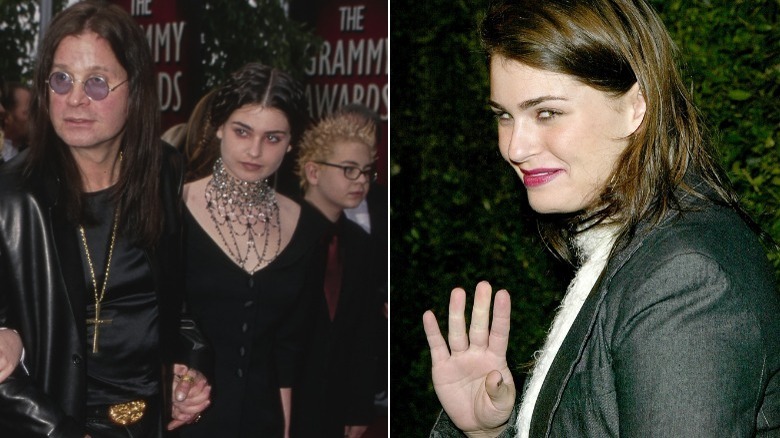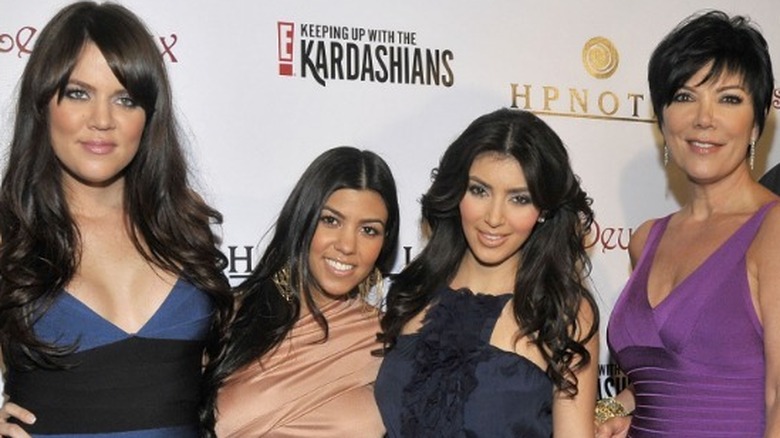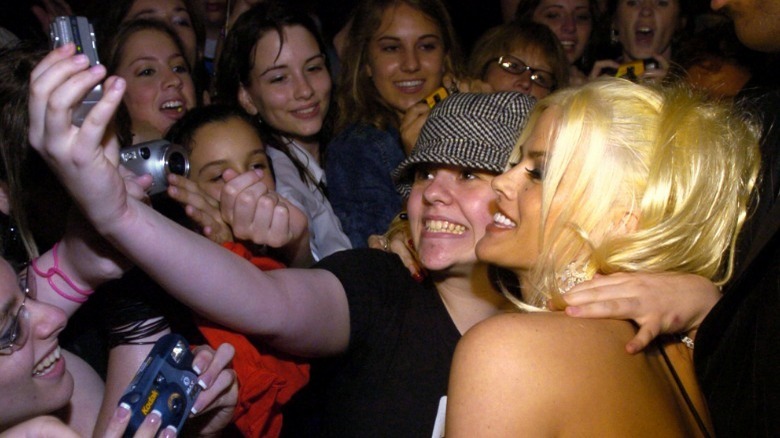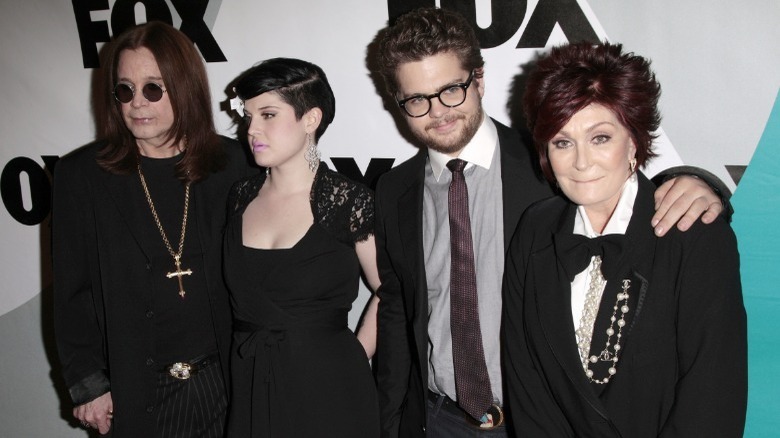How The Osbournes Made Its Legendary Mark On Reality TV History
When the pilot episode of "The Osbournes" aired on MTV on March 5, 2002, things were different. Reality TV consisted of "Cops" and "The Real World." If you tried to explain "Keeping Up with the Kardashians" to the average 2002 person, they would've assumed you were on lots of drugs. There was no social media, and no smart phones. It's hard to imagine the context today, but one series about the daily lives of an aging heavy metal rockstar and his family completely changed culture and reality TV forever. The show was MTV's highest rated and most watched program and served as a proof-in-concept many reality shows replicated down the line.
The Osbourne family took a bold risk by allowing MTV into their home to film 24 hours a day over three years and broadcast four seasons of their private lives into homes around the world. It paid off — the show was the first of its kind to win a Primetime Emmy. Ozzy's career and the careers of his family were catapulted into legendary status, and a new era of docu-sitcom reality TV overtook American culture.
The show paved the way for reality TV celebrity culture
It's challenging to recall a time before we were inundated with reality shows about the personal lives of famous people, but such a time existed. Back in the day, famous people were more or less exclusively seen on the silver screen, in tabloids, or — like Ozzy Osbourne – playing in rock arenas.
However, all that changed when the Osbournes became the first celebrity reality show family. At the time, there wasn't a template for this, and MTV believed the show wouldn't succeed because it had no story. Once "The Osbournes" hit the mainstream, however, it was clear the show appealed to audiences for other reasons. The sight of Ozzy taking out the trash could capture the nation.
Audiences already loved sitcoms about family antics, bumbling dads, and hyper-capable moms (think "The Simpsons," "Home Improvement," "Everybody Loves Raymond," etc.), so "The Osbournes" had familiar elements that made it the perfect gateway show into reality TV. Viewers were immediately hooked by the Osbournes' mundane antics; right from the jump, Ozzy's frustration with his remote control in the pilot episode became the stuff of legends.
Although the show touches on Ozzy's music career, the bulk of its content focuses on Sharon, Jack, Kelly, their support staff, and their multitude of dogs and cats. The big personalities of Ozzy's family more than made up for their lack of what's conventionally considered "talent," and other celebs took notice — constantly working, touring, and filming is hard work, but being interesting enough to star in a reality show seemed easier. Soon Jessica Simpson, Nick Lechey, and Gene Simmons had their own shows in the works.
Inadvertently, "The Osbournes" started the culture of people who are famous for being famous (Paris Hilton, the Kardashians, etc), creating avenues to success for non-traditionally gifted entertainers.
The Real World + Cribs = reality TV gold
One of MTV's first hit reality shows began as an experiment in documentary, and through an organic chain of events developed into "The Osbournes." MTV shot its pilot episode of "Cribs" at the Osbournes' home and saw potential for a reality show in the family's over-the-top antics and banter. Producers spoke with the family about making a show like "The Real World" in their home. The Osbournes agreed to three weeks of shooting as they moved into their new home in Beverly Hills (a la "Beverly Hillbillies"). MTV was okay with the initial time limitations, as they didn't know if three weeks of footage would be usable as a show. They would film for another three years.
"Here's the thing: We didn't know what we were signing up for. Now there is a frame of reference for this genre, but back then the only reference we had for reality TV was 'The Real World,' 'Road Rules,' 'Cops,' and the odd documentary here and there. 'Lifestyles of the Rich and Famous,' whatever," said Jack Osbourne during the show's 20th anniversary oral history (TheRinger.com).
Producers called up the team on "The Real World" to find out how they made the show and adapted their techniques to "The Osbournes." The main approach was to film literally everything and painstakingly go through footage to piece together arcs for an episode.
The production broke rules: they engaged with the subjects, lived in the Osbournes' home, and developed an authentic rapport with the family which led to relaxed, genuine moments on camera. The production also made a safe space in the house free from cameras so the family could escape the limelight and find privacy. Often, Ozzy would take a break from the cameras by hanging out with the film crew.
The show created the modern docu-sitcom format
"The Osbournes" set the tone for the reality shows that followed featuring families with exaggerated personalities in banal situations in their suburban homes. Despite creating the proto-format for a prolific subgenre of reality TV, producers at the time thought of the show as a docu-sitcom.
"We never considered it a reality show," said executive producer Jeff Stilson. "I don't even think I knew what that term was. I knew what documentaries were, and we considered it to be a documentary sitcom. ... We wanted 'The Osbournes' to be the opposite of 'The Real World.' We didn't want interviews because we wanted to tell our story in scenes like a sitcom."
According to Vice, the format of docu-sitcom was actually created years earlier with PBS' proto-reality show "An American Family" (1973) and its 1974 working-class BBC spin-off "The Family." Nearly 30 years later, "The Osbournes" expanded on the format using quick-cut edits for less of a documentary tone and avoided relying on cutaway interviews to explain the story.
"When the camera is there, most people have a tendency to explain stuff a little bit more, but Ozzy didn't really do much of that," said editor Greg Nash in the show's 20th anniversary oral history. "Sharon did and that was a key ingredient. That's why on-camera producing didn't need to happen because she was helping you translate 'here's what's going on here' without it being a stupid interview."
The production team took about 10 days of footage to create one episode. Their editing process focused less on voyeurism and more on bringing the audience into the warmth and humor of the family.
A cultural reset for a post-9/11 world
"The Osbournes" was a right time, right place, right people success story. Its novelty and rawness was uniquely suited for a time when a rapidly changing social landscape, the internet's impact on the entertainment industry, plus the existential horror of the 9/11 attacks all made reality feel off kilter in a way to which MTV viewers were not accustomed.
"The early 2000s, I think, are very much overlooked, because it was a really weird and wacky time," said Jack Osbourne, reflecting on the show's cultural impact in the show's 20th anniversary oral history. "I've said this for years, but I attribute a huge amount of the success of 'The Osbournes,' morbidly, to the fact that it was a post-9/11 world. I think everyone was so confused and bewildered, and just like, 'What the [expletive] are we living through right now?'"
He continued, "I think, in America anyway, when people turned on the TV and saw a family that they in their mind perceived to be nothing like their own, then watching it and going, 'In a way, this is a lot like our family,' I think that provided a weird sense of comfort and solidarity in a kind of heady way."
The counterculture and the mainstream loved "The Osbournes." People in conservative families were fascinated by the opposite-land upbringing Kelly and Jack experienced surrounded by skulls and cursing, the assertive and often aggressive communication in the family, and the strange warmth of seeing people accept themselves and one another for their weird, flawed selves.
The Osbournes legitimized reality TV as a lasting genre
Although the show began as an experiment, the success of "The Osbournes" cemented reality TV as a highly profitable market. It legitimized the genre by being the first show of its kind to win a Primetime Emmy, much to the family's surprise, plus its insane success sealed the deal.
Reaching an audience of 6 million viewers in the U.S. and 500,000 in the U.K. regularly, the show rocketed to the highest-rated show in MTV's history shortly after the pilot aired. According to Time, Season 1 is the all-time most watched series ever on MTV; the show's Season 1 finale — a hodgepodge of random scenes from leftover material arranged around an interview with Ozzy — had about 7.2 million viewers.
"There were weeks when we got 8 million viewers or more and it was at a time where there weren't as many channels," said producer Greg Johnston in the show's 20th anniversary oral history. "If you had success on television, it was a cultural phenomenon."
"The Osbournes" proved reality TV was hot and directly paved the way for more docu-sitcoms about celebrities such as "The Anna Nicole Show" in 2002, "Newlyweds: Nick & Jessica" and "The Simple Life" in 2003, "Dog the Bounty Hunter" and "The Ashlee Simpson Show" in 2004, "Britney & Kevin: Chaotic" in 2005 and "Keeping Up the Kardashians" in 2007, to name a few.
The Osbournes set the tone for viral vids and social media
"The Osbournes" put Jack and Kelly's awkward teenage years on blast well before social media achieved total ubiquity. Nowadays, kids are routinely humiliated by parents posting their awkward moments online. Jack and Kelly grew up pre-social media, but they were pretty much the only two kids at the time to be viewed by millions during their most brutal teenage years.
During the show's 20th anniversary, Sharon Osbourne said, "The one thing that I am so relieved about was that at that time there was no social media. Because God only knows what would have happened. The press was bad enough about my kids. We probably wouldn't have lasted longer than a week."
However, those embarrassing moments would make the show. Kids got to grow up with Jack and Kelly and commiserate whenever cameras caught Jack hitting on his best friend's girlfriend, or Ozzy poking fun at Kelly's frequent outbursts. The show gave our culture a hunger for these genuine moments in the inner lives of people, instead of the glossy veneer of public face. The audience's newfound taste for a wacky version of mundanity influenced the nature of later viral vids and the whole appeal of TikTok — arguably an app entirely made of indie reality TV.
Would today's culture still be producing videos with the same sensibilities without the examples that "The Osbournes" gave us? Would we have the exact same tastes without Ozzy tripping over the dog bowl 15 years before TikTok gave the power to make our own personal reality shows for the masses?
The signature bleep
From the family's many tattoos, frequently dyed hair, ever-evolving piercings, and their home's skull-based decor, "The Osbournes" was edgy and counterculture. The edgiest edge, however, was a string of curse words delivered with deep British accents. The entire family cursed like sailors throughout the series, censored by a stream of bleeps that could have diminished the show's appeal. However, the constant bleeps became a signature soundscape all its own.
Down the line, the use of bleeps on reality shows has been fine-tuned to allow subjects to express themselves while adhering to censorship guidelines. Later shows such as "Below Deck" and "The Real Housewives" series utilize the signature bleep not just to censor, but to cue the audience — viewers know a bunch of bleeps means conflict is happening, and conflict is interesting.
According to Time, Ozzy stated that while he was happy that certain broadcasts of the show outside of the United States aired uncensored, he actually preferred the censored version because the bleeps, ironically, made the cursing much more noticeable and easier to understand.
Stoner comedy meets reality TV
Ozzy's mumbling, stumbling, and bumbling is the hallmark of the show; his frequent calls for "Sharon!" are locked into cultural reference canon. However, his manner wasn't just a charming quirk, or early signs of his neurological disorder — he was stoned the entire series, as he admitted in an interview with BBC Radio 2 in 2009.
"As Ozzy will tell you, the three years that we were filming, Ozzy was stoned the whole time," Sharon told the Daily Record. "He wasn't sober for one day."
Ozzy added, "When the filming ended, I'd go in my little bunker and smoke a pipe and drink about a case of beer every day."
The show normalized discussing substance use, abuse, and dependence on and off screen, as Ozzy, Jack, and Kelly each had their struggles with addiction. Seeing the reality of substance use and abuse in a casual light was new to viewers accustomed to Hallmark movies and dramatic plot arcs, and the show redesigned viewer expectations to understand and relate to people who were various degrees of sober (and not).
The precedent to cast reality stars with substance use issues continued onward with more tragic outcomes in other shows — Anna Nicole Smith (1967 – 2007) is a later version of that slurring, obviously intoxicated reality TV celebrity.
Privacy in a glass house
Aimee Osbourne, Ozzy and Sharon's oldest child, refused to be on the show, moved to a nearby apartment during shooting, and is omitted and-slash-or blurred out when she makes a rare appearance. According to MetalInjection.com, she wanted to pursue a music career and felt being on the show would harm her chances of success. Ironically, the show launched Kelly's music career.
The show blurred out faces and set a precedent for respecting the privacy of subjects in reality shows, for better or for worse. In an interview with Jamie Kennedy, Jack Osbourne dished some dirt — MTV aired the first season without obtaining clearance from the family, which was a massive legal violation, particularly considering there were minors involved. This gave the Osbournes huge negotiating power with Viacom on their compensation for later seasons, going from earning thousands to millions. If MTV hadn't messed up so badly on Season 1's rights, perhaps reality TV wouldn't be the lucrative genre it is today.
The show's popularity destroyed the Osbourne family's privacy in Beverly Hills, drawing onlookers to their yard. The Osbournes weren't the type to get mad — they tend to get even in their unique way. They built a wall around the property equipped with a remote-controlled sprinkler system to spray at trespassers. Some of the most entertaining moments on the show are sequences when Ozzy and Jack get pure joy out of watching intruders run from the sprinklers on security camera footage. The family handled the inconveniences of fame in their classically entertaining, oddball style.
The OG celebrity rebrand cash cow
Before reality TV, a celebrity's career was over when their original celebrity status faded. "The Osbournes" was the first reality TV celebrity rebrand. Strictly in terms of mass-public perception, Ozzy went from bat-biting addict to bumbling, lovable dad. Before that happened, Ozzy had no way of knowing whether the show would ruin his career. But the popularity of "The Osbournes" introduced his music to new generations who were, in many cases, way too young to remember Black Sabbath.
Later, "Keeping Up the Kardashians" pulled a similar rebrand to help culture forget that their family's success is partially due to Robert Kardashian defending OJ Simpson during his murder trial.
"The Osbournes" revealed new revenue streams for washed-up celebs; if someone is interesting, funny, or grotesque enough, they have a second chance in reality TV. The Osbournes banked on the series, according to HenryHerald.com – each family member made $20,000 per episode for the first season and negotiated for significant raises on subsequent seasons. Sharon negotiated contracts for Season 2 to $5 million per family member for the season. The family also retained ownership of the series and all syndication, licensing, and merchandise rights, plus a hefty book deal and a reported $7 million deal for the release of the first two seasons on video and DVD.
The show launched the media careers of Sharon, Jack, and Kelly Osbourne in everything from chat shows to pop music to film and TV production. Notably, Jack dropped out of high school when the show's popularity interfered with his ability to learn in peace and began a long-running career in the film industry. He's gone on to produce 15 documentaries and reality TV series (IMDb), continuing to shape the genre that he and his family set in motion nearly 21 years ago.
Pushing reality TV stars to the edge
The popularity of "The Osbournes" wore on the family. Ozzy, Kelly, and Jack struggled with substance abuse and difficulty with the constant media spotlight and public attention, and Sharon fought colon cancer on national TV. The struggles made for compelling television but came at a cost for the show's stars. The show didn't stage or script its content, and producers later said that, at that relatively early stage in reality TV, they weren't aware of the full scope of consequences for its stars. Later reality shows wanted to replicate the organic conflict and intensity that made "The Osbournes" great, but sometimes used less-than-organic means to stage arguments or manipulate stars and situations to boost ratings (Insider).
The cost of reality show stardom has gotten steeper since "The Osbournes," with an overwhelming amount of reality stars lost to overdose and murder (RadarOnline.com). The toll on mental health for stars, crews, and viewers is an ever-evolving conversation.
According to the International Journal of Communication, there are many ethical concerns around producers manipulating and pushing reality stars into severe distress for entertainment value.
"The Osbournes" feels unique because the show began as a creative filmmaking experiment that grew into a labor of love. During filming, the crew gained considerable affection for the family while living with them, and that genuine flavor of care really sticks out in contrast to later shows that brutally push their stars into cruel situations.
In the show's 20th anniversary oral history, segment producer Henriette Mantel said, "It was really such a new frontier back then... Now you watch these shows, and it's got to be filmed in three days with interviews and setup scenes that are most of the time fake."
Reality TV's success is Its undoing
"The Osbournes" was the first docu-sitcom reality TV show to be massively successful, and its success ruined its original appeal. Season 1 was shot when the family still had some privacy and anonymity — they could focus on everyday life, as opposed to later seasons when they're focusing on the fame and fallout from the show.
The show became about the show. The family got too famous and self-conscious, and that slice-of-life vibe that made the show great faded away. This precedent followed in subsequent reality series; the popularity of reality TV shows often changes the subjects and show for the worse, with 2009's "Jersey Shore" perhaps standing as the most prominent example of a hit show that arguably lost its edge when its subjects went from unknowns to overnight celebrities.
The Osbourne family chose to end the show after four seasons on high note, instead of getting canceled eventually. During the show's 20th anniversary oral history, editor Greg Nash said, "When someone asks, 'What was your favorite job ever?' I'll always say it was the first season of The Osbournes. We felt like we were creating something that didn't exist. It's a shame it got turned into a genre that's so disgusting and lame and fake, but at that moment, it was something cool."
